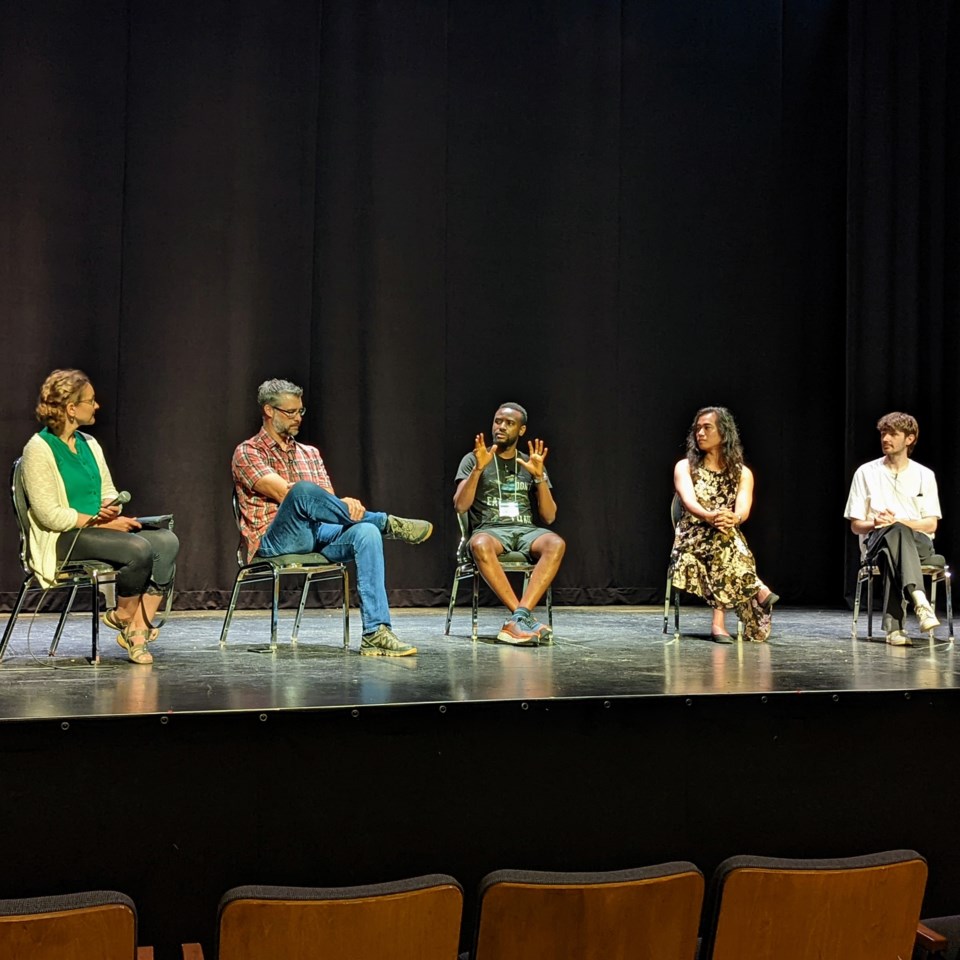On the final day of the Saskatchewan Festival of Words, four authors joined moderator Amanda Leduc on stage in the Mae Wilson Theatre to discuss what the publishing experience is like from various points of view — from new writers to veterans.
[Editor’s note: Jason Purcell uses non-binary pronouns (they/them). In adherence with Canadian Press style guidelines, their preference is respected in this article.]
Panel authors who participated in the Festival’s “Cover to Cover” panel on July 17 include:
- Suyi Davies Okungbowa — Okungbowa writes in the fantasy and science fiction genres. His latest work includes The Nameless Republic epic fantasy trilogy. Okungbowa is a professor of creative writing at the University of Ottawa.
- Jason Purcell — Purcell is co-owner of Glass Bookshop in Edmonton. As a chronically ill person, they write at the intersection of queerness and sickness. Swollening (2022) is their first full-length poetry collection.
- Wayne Simpson — Simpson is an award-winning photographer based in Elora, Ontario. He recently published his first book, Resilient (2021), which combines photography with biographical essays about his subjects.
- Kai Cheng Thom — Thom is a writer and performer based in Toronto. She is the author of five award-winning books spanning several genres. Her children’s book From the Stars in the Sky to the Fish in the Sea was featured on Dame Julie Andrews’ podcast.
Leduc’s first question to the panel was intended as a joke, but addressed the most-asked question of prospective authors: Will writing make me rich?
The answer was, of course, that it depends.
“There are such different levels of financial reward in publishing,” Thom expressed. “When I started out, I would a reading or appearance for $50 to $150. That’s really changed now that I’m mid-career. Now it’s somewhere between $200 and $500 an appearance.”
Thom said that gradually becoming successful has changed her life significantly, allowing her to take time off from her regular job to do more writing.
Purcell noted humorously that poetry collections are not known for making their authors wealthy, but continued to say that their publishing journey had much to do with community connections. They have been involved in writing, publishing, journalism, and sales, and said that building relationships in those fields led to collaborations that resulted in their collection.
“When I think about my path to publication, I thin about all of the people who have helped me and brought me there,” Purcell said. “It’s conversational, and it’s community-based.”
Continuing the dialogue, Okungbowa weighed in to say that his publishing experience has varied widely based on the genre he was writing in.
“Often what happens is the publishing house and property they’re working with decide they want a book about something,” he explained. “Stranger Things is a good example.”
Okungbowa said that Netflix put out feelers for literature connecting the show’s seasons together. A subsequent interview led to his being given the opportunity. The same process resulted in collaborations on Minecraft, Marvel’s Black Panther, and others.
For his original works, Okungbowa said that success brings increasing amounts of teamwork. Designers, editors, proofreaders, fellow authors, and fans all contribute. The writing process goes from solitary to social.
Simpson was the newest writer on the panel, and said his experience was amazing.
“I kind of feel like I snuck in the back door,” he said. “I have a couple of friends that have published photography books with Rocky Mountain Books out of Vancouver. … I found that they had been watching my work on social media. … I touched base with them, and basically it just happened.”
Simpson put his own book together — he has a background as a graphic designer — and was pleased to find that his publisher was open to his creative ideas. His essays became longer and more a part of his book as he became interested in telling the stories of his subjects.
As the panel concluded, Leduc and the panel members agreed that the environment for new writers is less hostile than many fear. The writing, reading, and publishing communities are united by a love of words and art.
The message? Put yourself out there and see what happens.




